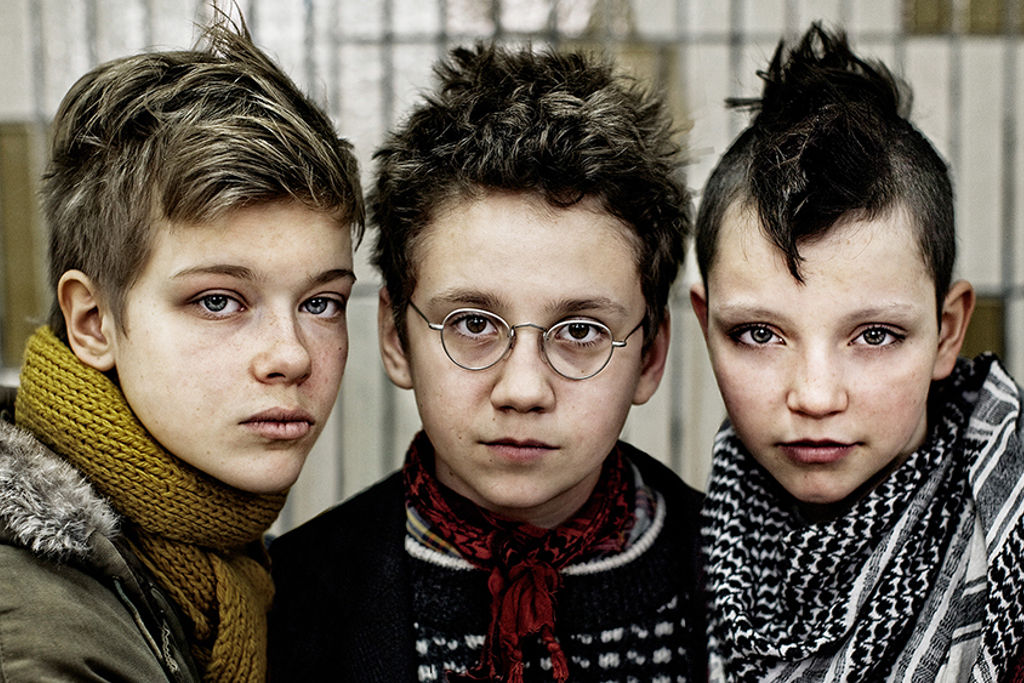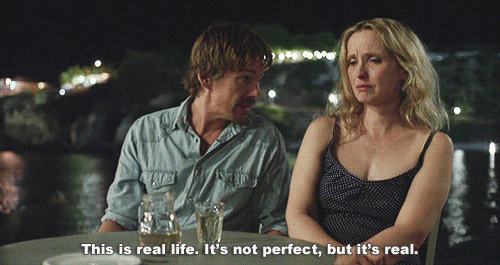‘Boyhood’ Is A Great Film About Growing Up, But ‘We Are The Best’ Is Better
We need more coming-of-age films about awesome young ladies.

By now you’ve surely heard about Richard Linklater’s Boyhood (2014), the Texas native’s 12-year filmmaking experiment where he and a cast (including Ethan Hawke and an Oscar-worthy Patricia Arquette as the parents) regrouped for a week once a year to follow the story of a boy (Ellar Contrane) from age six to eighteen.
We’ve mentioned it a few times before; it screened at the Melbourne International Film Festival, and is going like gangbusters at the box office. It’s certainly an impressive feat of cinema, one that allows its near three-hour length to feel not like a butt-numbing exercise, but rather a way to view the changing tides of a boy’s life through abusive step-parents, leering at lingerie catalogues for cheap thrills, smoking pot for the first time, and heading for college.

–
Girls Just Want to Have Fun
In stark contrast to Linklater’s Boyhood is Lucas Moodysson’s We Are the Best! (2014). Out in local cinemas just two weeks after Boyhood, it’s sadly unlikely to get the audience recognition that it deserves, primarily because it’s got subtitles and is about, well, girlhood. Remember, half of the world’s population makes you ‘niche’. Young audiences especially should be encouraged to see the film.
Set in 1980s Stockholm, We Are The Best! focuses on three teenagers who start a punk band — initially out of spite to stick it to the older, male band that is occupying their youth centre’s space, but then as a way of dealing with the internalised hurricanes of feelings that each of them is dealing with. Neglectful parents, school, body and beauty issues, religion, inadequacy, and more – the type of emotions and demographic that are so often reduced to pantomime clichés. It’s great to see them treated here so carefully. It can certainly sit proudly alongside Welcome to the Dollhouse (1995) and Ghost World (2001) in that regard.

As more and more female filmmakers begin to find a voice in the industry, hopefully more of these stories will emerge. Sofia Coppola has spent her entire directorial career attempting to shine a light on this under-served demographic with movies like The Virgin Suicides (1999) and Somewhere (2010), while Sophie Hyde’s 52 Tuesdays (2014) put a fresh and exciting twist on the female coming-of-age dynamic, place its heroine’s story alongside that of her mother transitioning from female to male. That film was filmed much like Boyhood, with the cast and crew reconvening on every Tuesday for 52 weeks to follow the development of these characters across a single year.
Céline Sciamma, who previously made the excellent trangender youth drama Tomboy (2011), had her latest film – coincidentally titled Girlhood (2014) – premiere at the Berlin International Film Festival, and actress Asia Argento recently premiered Misunderstood (2014), which focuses on the tug-of-war the youngest of three daughters experiences between her two seemingly disinterested parents. It stars French actress Charlotte Gainsbourg, who previously starred in Julie Bertuccelli’s Australian-set drama The Tree (2010), about a young girl dealing with the loss of her father.
Some of these are brilliant, others less so, but they are all films that highlight the predominantly younger female point of view, and do so with stories that don’t feel like retreading similar adolescent tropes that Boyhood frequently indulges in.

–
Boys vs Girls
The critics have certainly agreed that both Boyhood and We are the Best! are worthwhile, with the former attracting an almost unheard of 99% on Rotten Tomatoes from nearly 200 reviews and the latter scoring 97% from about 100. That’s some high acclaim to live up to, and I personally don’t quite think Linklater’s film does. As fascinating as Boyhood’s concept is, making the main character of Mason such an identifiably ordinary audience cypher risked making the film 165 minutes of time spent with the most average kid in town, and that doesn’t necessarily make for great cinema. At times it comes perilously close.
Mason is meant to evoke misty-eyed feelings of nostalgia in the audience. He’s a character that the filmmakers are banking on transporting viewers (especially men) back to their own childhood where they, too, maybe once lay on the green grass dreaming of the big wide world ahead of them. In doing so, I felt the film lent too heavily on the fairly bland and innocuous experiences of a white, middle-class, suburban male who ultimately has a fairly blessed life.
The mother, as played by Arquette, would’ve been a more interesting central figure. Motherhood, perhaps. If it weren’t for the exceptional concept – and Linklater indeed deserves kudos for even attempting it, just like his periodical Before trilogy – there isn’t much in Boyhood that audiences would be expected to care about.

–
Rebels, Breakfast Clubs, and Alibrandi
Predictably, I found myself relating to the adolescence of the Swedish film more than Boyhood, even if my own teen years weren’t similar to either. Moodysson’s film, more so than Linklater’s, manages to craft truly inspired characters that speak to how teenagers experience those years as they are happening, rather than through the wistful mirror of time.
Both, however, deserve to enter the pantheon of coming-of-age titles alongside classics such as Rebel Without a Cause (1955), The 400 Blows (1959), and The Last Picture Show (1971), as well as more recent ones like Stand By Me (1986), the works of John Hughes including The Breakfast Club (1985), and the Australian classic Looking for Alibrandi (2000), a film that has plenty of its own keen observations about female teenagers.

I would implore audiences to check out both films. Unlike any of the mainstream films that will be released at 300+ cinemas this month, both Boyhood and We Are the Best! are worth your money and they may just be beneficial to young audiences trying to find their place in the world.
–
Boyhood is in cinemas now. We are the Best! is in limited release this week.
–
Glenn Dunks is a freelance writer from Melbourne who is currently based in New York City. He also works as an editor and a film festival programmer while tweeting too much @glenndunks.